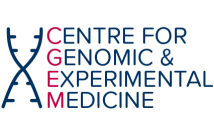Honorary doctorate for Denis Rutovitz
July 2017: Honorary doctoral degree awarded to former IGMM staff member, charity founder and aid worker.

In a coming together of IGMM staff from past and present, Dr Denis Rutovitz has been awarded an honorary degree of Doctor of Science by the University of Edinburgh.
CGEM’s Professor Cathy Abbott presented Dr Rutovitz for his honorary degree, providing the Laureation address which summarised of some of Denis’ many achievements, including his research at the MRC HGU and his considerable charitable work. Background information for the address was contributed by several IGMM staff members, past and present, including Richard Baldock, Semir Kazazik, Bill Hill and Jim Piper. Jim, together with Judy Fantes, also ex-HGU, were amongst the guests at the graduation ceremony.
Denis Rutovitz has variously and accurately been described as a modern-day saint and a force of nature […] we are also honouring him as a scientist.
From the mid-sixties Dr Rutovitz led a team of researchers in the MRC Human Genetics Unit before becoming Assistant Director of the unit in 1977 where he remained until his retirement in 1993. His group’s research helped promote the importance of integrating mathematics into biological and medical research, whilst also developing equipment and techniques for clinical applications in both prenatal testing and cervical cancer screening.
In 1992, when the war in Bosnia was at its height, Denis and his wife Jeanne Bell, another distinguished Edinburgh scientist and clinician, founded the charity Edinburgh Direct Aid. For the first three years Denis led the majority of their aid convoys, where in 1994, his convoy came under fire outside Sarajevo, and he was hit by a machine gun bullet in the chest.
Since the war in Bosnia officially came to an end in 1996, EDA has continued to provide aid all over the world, leading multiple initiatives to countries including Kosovo (during and after the Croatian War of Independence), Sri Lanka (after the tsunami), Pakistan (after earthquake and floods), and Kenya (for AIDS orphans). Researchers and ex-colleagues at the IGMM continue to support the important work carried out by EDA and have held several craft sales over the last few years to raise money for this charitable initiative.
[Denis] has let nothing stand in his way of helping the most desperately in need, and is a true hero. I can think of no better, more inspiring example for […] graduates of the Edinburgh Medical School.
Currently EDA’s principal efforts are for Syrian refugees. EDA have not only provided housing, clothing and schoolrooms, but have also set up vocational training for young people in a Lebanese village near the border with Syria. There are 70,000 refugees and 35,000 Lebanese inhabitants in this location, where EDA continue to deliver considerable quantities of vital aid.
Related links
Full story on the University of Edinburgh College of Medicine & Veterinary Medicine website


